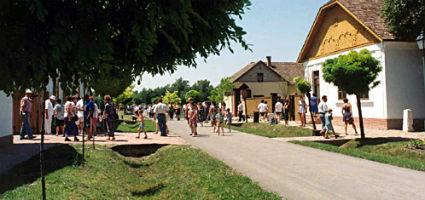2025. April 26. Saturday
Ópusztaszer National Historic Memorial Park - Ópusztaszer
 |
Address: 6767, Ópusztaszer Szoborkert 68.
Phone number: (62) 275-133 /103, (62) 275-133 /104
E-mail: info@opusztaszer.hu
Opening hours: 01.04-30-10.: Tue-Sun 10-18
01.11-30.03.: Tue-Sun 10-16 (Skanzen, external exhibiton closed) The current fare for those interested informed about the institution's website: www.opusztaszer.hu |
Among the towns of the beginning of the 20th century, Szeged had the largest population living in homesteads surrounding the town. In 1930 over 45 000 people lived in 10 000 homesteads of 10-15 acres around Szeged. The homestead we present at our exhibition, the placement and characteristics of the buildings was significant at the turn of the 19-20th centuries. The premises of the house followed the room-kitchen-room-chamber order.
Entering the farm, we first step on the porch. The vault is covered by tile made in North Hungary. Under the chimney, on the stove at the mouth of the furnace the cooking was performed on pottery or cast iron dishes.
Right to the porch the 'big house', left the 'small house' could be found. We present a family where generations lived together.
The table and the corner bench stood in the big house opposite to the furnace. Behind the pictures of saints, sacred candles hang on the wall. The name 'sacred corner' received its name after these. The commode stood in the other corner. The original linen was kept here. On top of the commode, sacred objects were placed besides the bowls and other dishes.
Opposite to the house the barn and the shed were built where the tools of farming were kept. The paprika grind is also displayed here. In Fall the paprika hang on thread was dried in the shed as well.
The homestead of Szeged recalls the memory of an era in which the peasants grew paprika, fruits and grapes. This are is history by now.
Entering the farm, we first step on the porch. The vault is covered by tile made in North Hungary. Under the chimney, on the stove at the mouth of the furnace the cooking was performed on pottery or cast iron dishes.
Right to the porch the 'big house', left the 'small house' could be found. We present a family where generations lived together.
The table and the corner bench stood in the big house opposite to the furnace. Behind the pictures of saints, sacred candles hang on the wall. The name 'sacred corner' received its name after these. The commode stood in the other corner. The original linen was kept here. On top of the commode, sacred objects were placed besides the bowls and other dishes.
Opposite to the house the barn and the shed were built where the tools of farming were kept. The paprika grind is also displayed here. In Fall the paprika hang on thread was dried in the shed as well.
The homestead of Szeged recalls the memory of an era in which the peasants grew paprika, fruits and grapes. This are is history by now.